FIDM's curriculum is intense, concentrated, and rewarding. The college prepares students to enter the global industries of Fashion, Visual Arts, Interior Design, and Entertainment. Our graduates enter the market as highly trained professionals, ready to make a contribution. We offer Associate of Arts, A.A. Professional Designation, A.A. Advanced Study, Bachelor's, and Master's Degree programs designed to enhance a variety of educational backgrounds. Every program leads to a degree. Our curriculum has been developed, and is continually updated, to reflect the needs of each industry served by our majors.
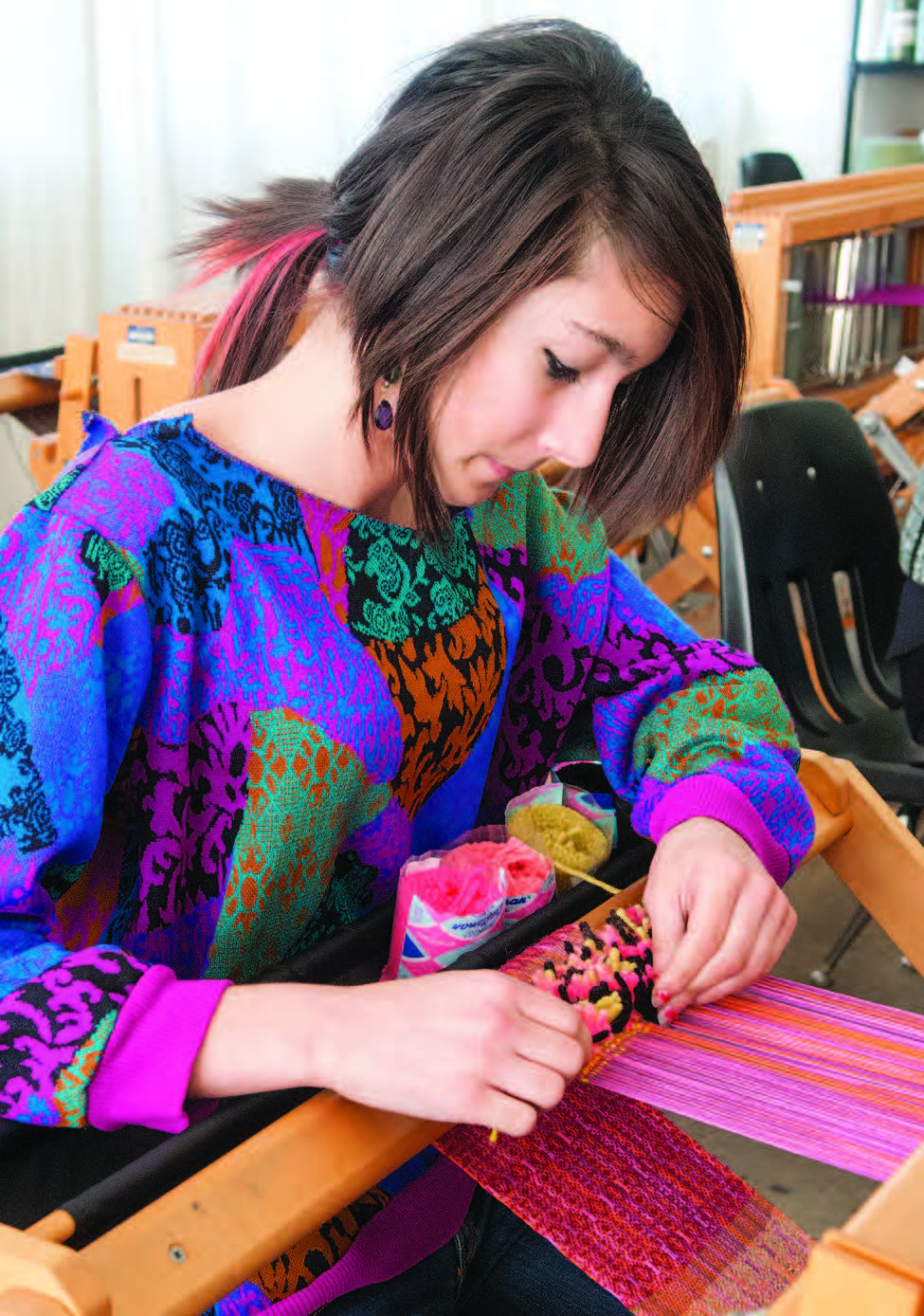
Associate of Arts Degree Programs
Associate of Arts Programs are designed for students who have a high school diploma or the recognized equivalent. These programs offer the highly specialized curriculum of a specific major, as well as a traditional liberal arts/general studies foundation:
– Apparel Industry Management
– Beauty Marketing & Product Development
– Digital Media*
– Fashion Design*
– Footwear Design & Development*
– Graphic Design*
– Interior Design*
– Jewelry Design*
– Merchandise Product Development
– Merchandising & Marketing
– Social Media
– Textile Design*
– Visual Communications*
Associate of Arts Professional Designation Degree Programs
Professional Designation Programs are concentrated programs for individuals who hold an accredited degree from a U.S. college or university, a certified international Bachelor's or higher degree, or have completed at least 45 semester units of transferable academic coursework at an accredited college. These are programs of intensive study in one of the college's specialized majors and culminate in the Associate of Arts degree. These programs complement prior educational experiences. Programs are offered in the following majors:
– Apparel Industry Management
– Beauty Marketing & Product Development
– Digital Media*
– Fashion Design*
– Footwear Design & Development*
– Graphic Design*
– Interior Design*
– Interior Design* – Jewelry Design*
– Jewelry Design* – Merchandise Product Development
e i
– Social Media
– Textile Design*
– Visual Communications*
Acceptance to the Professional Designation Program is contingent upon:
U.S. Students:
1. Possession of a degree from a regionallyaccredited college or university, or
2. Official transcripts from a regionallyaccredited college or university showing successful completion of at least 45 semester units of transferable academic coursework.
3. Associate of Applied Science degrees (AAS) and degrees granted by nationallyaccredited institutions require transcript review to verify academic preparation and number of credits earned in liberal arts subjects.
International Students:
1. A certified International degree equivalent to an accredited U.S. Associate's, Bachelor's, or Master's degree.
2. TOEFL score of 183 (computer-based) or 65 (internet-based) –OR– passing score on FIDM's Essay and English Placement Exam.
Associate of Arts Advanced Study Degree Programs
Associate of Arts Advanced Study Programs develop specialized expertise in the student's unique area of study. Admission is limited to candidates who possess a prior FIDM degree in a related discipline. Programs are offered in the following majors:
– Beauty Industry Management
– The Business of Denim+
– Entertainment Set Design & Decoration*
– Fashion Design*
– Film & TV Costume Design*
– International Manufacturing & Product
– Menswear*+
– Theatre Costume Design*
* All FIDM Art and Design majors are accredited by NASAD. FIDM is accredited by WASC Senior College and University Commission. + Open to qualified transfer students with a degree in a related field.
Bachelor of Arts Degree Programs
The Bachelor of Arts Programs are open to students who have earned an Associate of Arts degree from FIDM and to qualified transfer students and external degree holders (see list below for specific requirements). Courses are taught on campus and select courses are also available online in some states and internationally.
– Creative Industry Studies: Associate of Arts or Associate of Science degree, or 45-60 semester units of transferable academic credit
– Design*: FIDM A.A. in Fashion Design, Graphic Design, Interior Design, Textile Design, or Visual Communications
– Digital Cinema*: A.A. in Digital Media or in a related field
n D
– Graphic Design*: A.A. in Graphic Design – Interior Design*: A.A. in Interior Design
– Interior Design*: A.A. in Interior Design
– Social Media*: A.A. in Social Media or in a related field
Bachelor of Arts in Professional Studies Program
The Bachelor of Arts in Professional Studies Program is open to students who have earned an Associate of Arts degree and an Associate of Arts Advanced Study degree from FIDM. Courses are taught on campus and select courses are also available online in some states and internationally.
Specializations are:
– Beauty Industry Management
– The Business of Denim
– Entertainment Set Design & Decoration*
– Fashion Design*
– Film & TV Costume Design*
– International Manufacturing & Product Development
– Menswear*
– Theatre Costume Design*
Bachelor of Science Degree Programs
The Bachelor of Science programs are open to students who have earned Associate of Arts or Science degrees (see list below for specific requirements). All courses are taught on campus. All Business Management courses and select Apparel Technical Design courses are available online in some states and internationally.
–Apparel Technical Design requires an Associate of Arts degree from FIDM in Merchandise Product Development.
– Business Management is open to FIDM Associate of Arts degree holders and to holders of an Associate's degree in a related field (business administration, marketing, or entrepreneurship). The program emphasizes global management and entrepreneurship.
Master of Business Administration Program
The Master of Business Administration Program is designed for students who hold an Associate's and a Bachelor's degree from FIDM or an accredited . Courses are taught on the Los Angeles campus.
Distance Education
FIDM offers selected educational opportunities through distance education. Colleges offering the opportunity to take classes outside of their state must be authorized, or exempt from authorization, by each state in which they offer those courses. No assumptions of availability should be made on the part of the student until checking with FIDM's Admissions or Student Advisement Departments.
English as a Second Language
To enroll in classes at FIDM, students must have a minimum TOEFL score of 183 CPT or 65 IBT or pass the FIDM Essay and English Placement Exam. For students whose placement exam scores indicate the need for further practice in written English, FIDM offers a Developmental Writing course with emphasis on essay writing and grammar.
General Studies
The mission of the General Studies Department is to enhance the academic performance of students through a cohesive program of core classes in English, critical thinking, speech, math, history, economics, color and design, and in art history and textile science for certain majors. To promote ethical and global awareness and to facilitate the development of responsible and productive citizens, FIDM draws upon the rich cultural heritage of its diverse faculty, student body, and community, and incorporates these values through several courses in the curriculum.
One-on-One Advisement
One-on-one advisement is available to students from other FIDM majors to consider eligibility for special admissions to some Associate of Arts Advanced Study and Bachelor's Degree programs. Contact the appropriate department chairperson.
* All FIDM Art and Design majors are accredited by NASAD. FIDM is accredited by WASC Senior College and University Commission. FPending approval by FIDM's accreditors NASAD (National Association of Schools of Art and Design) and WSCUC (Western Association of Schools and Colleges Senior College and University Commission)
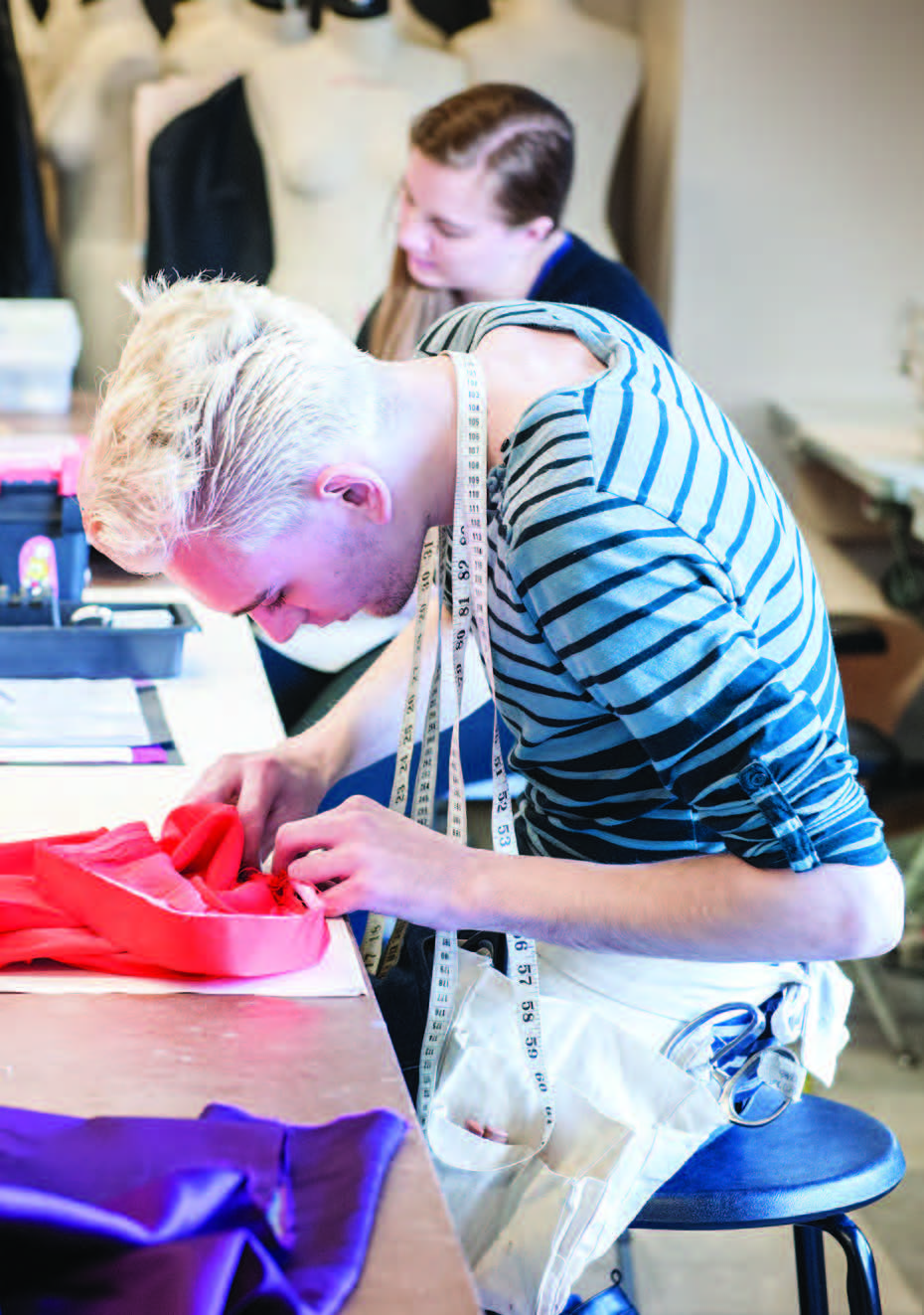
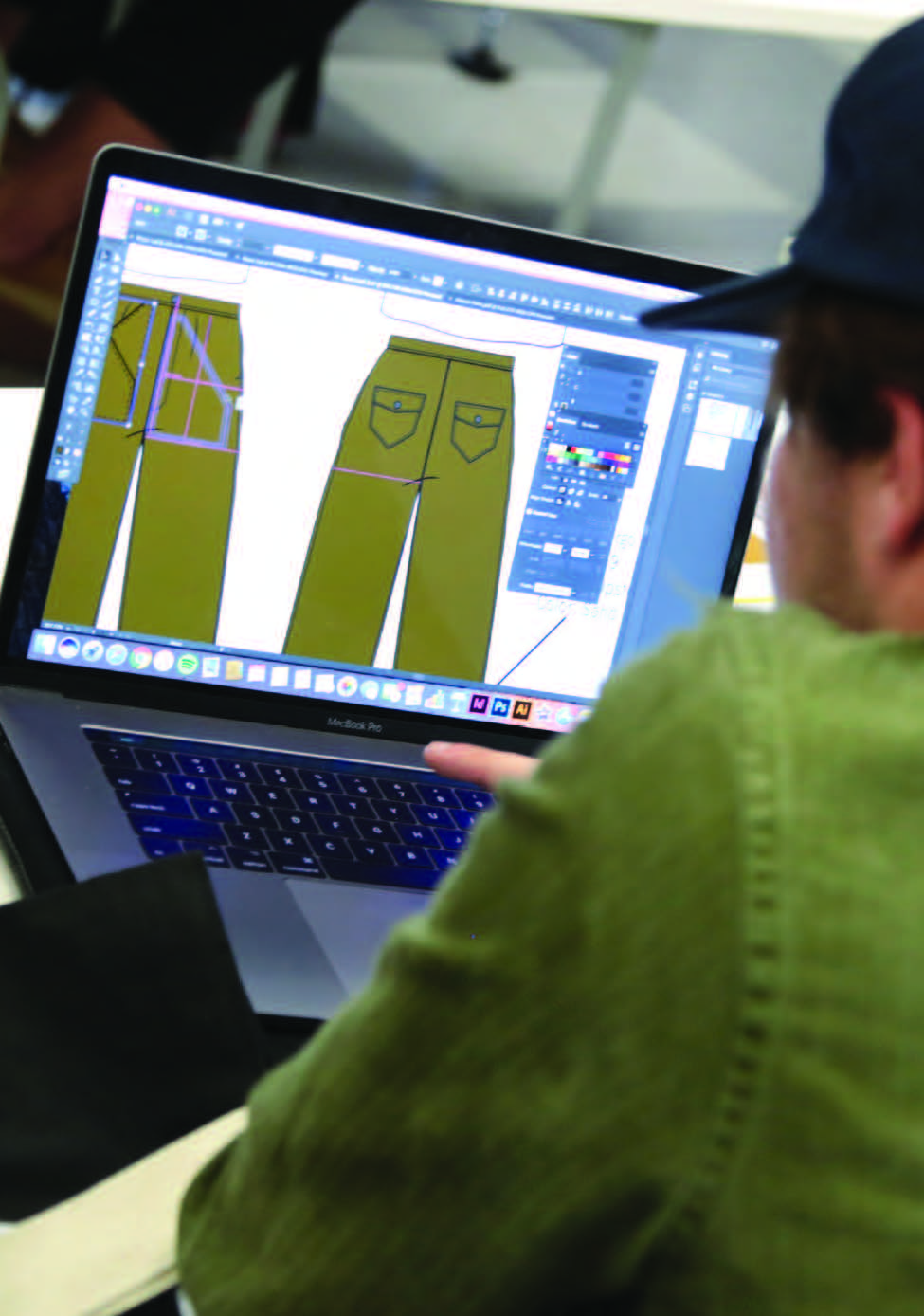
APPAREL INDUSTRY MANAGEMENT
The Apparel Industry Management Program is designed to prepare students for eventual ownership and/or management of a global fashion company. The program combines creativity, business knowledge, and computer technology, involving the student in all phases of product innovation including design, line development, global sourcing, production planning, technology use, sales management, financial control, and global human resources management. The curriculum stresses the importance of leadership, teamwork, creativity, critical thinking, and effective communication in decision-making from the visionary development of the initial concept to the delivery of the finished product.
What Our Students Learn In our program, students learn all aspects of running a fashion business, from concept development, design, global sourcing, production, and human resources, to final delivery to the customer.
Why FIDM Apparel Industry Management students learn how to turn their original designs into retail ready products. Graduates are working in positions as Creative Directors, Production and Sourcing Managers, and Import /Export Specialists. The classroom simulates an apparel industry facility, so students learn in an environment that is true to the industry. Using the right technology, promising fashion entrepreneurs have the opportunity to become industry visionaries. Our Apparel Industry Management major is endorsed by the American Apparel & Footwear Association (AAFA).
APPAREL INDUSTRY MANAGEMENT
REQUIRED CLASSES FOR ASSOCIATE OF ARTS (A.A.)
(for students without a prior college degree)
DESN 2540 Computer Pattern Drafting I
GNST 1040 English Composition
GNST 1230 Color & Design Theory
GNST 1440 Textile Science
GNST 1450 College Mathematics
GNST 1600 Effective Speaking
GNST 1650 Critical Thinking
GNST 2960 American Political & Economic History
FTG 1050 Survey of Manufacturing & Merchandising
MFTG 1150 Marketing Dynamics for Fashion
MFTG 1400 Apparel Process I (6 hours)*
MFTG 1700 Apparel Process II (6 hours)*
MFTG 1880 Computer Sketching I
MFTG 2050 Technical Sketching I
MFTG 2080 Computer Sketching II
MFTG 2120 Merchandising, Costing & Specification
MFTG 2330 Computer Grading, Marking & Cutting
MFTG 2350 Global Human Resource Management
MFTG 2420A Apparel Management Technology I
MFTG 2420B Apparel Management Technology II
MFTG 2500 Cost Control & Costing
MFTG 2520 Global Trade Dynamics
MFTG 2550 Production Control & Planning
MFTG 2580 Sourcing & Inventory Management
MFTG 2640 Quality Control Management
MFTG 2680 Wholesale Selling
MFTG 2720 Market Analysis & Presentation
MFTG 2780 Ownership & Finance
MFTG Elective: Three one-unit courses
TSCI 1700 Textile Testing for Quality Assurance
REQUIRED CLASSES FOR PROFESSIONAL DESIGNATION (A.A.) (for students with a prior college degree)
GNST 1440 Textile Science
MFTG 1150 Marketing Dynamics for Fashion
MFTG 1400 Apparel Process I (6 hours)*
MFTG 1700 Apparel Process II (6 hours)*
MFTG 1880 Computer Sketching I
MFTG 2050 Technical Sketching I
MFTG 2120 Merchandising, Costing & Specification
MFTG 2350 Global Human Resource Management
MFTG 2420B Apparel Management Technology II MFTG 2500 Cost Control & Costing
MFTG 2500 Cost Control & Costing
MFTG 2520 Global Trade Dynamics
MFTG 2550 Production Control & Planning
MFTG 2560 Computer Pattern Drafting, Grading & Marking
MFTG 2580 Sourcing & Inventory Management
MFTG 2640 Quality Control Management
MFTG 2680 Wholesale Selling
MFTG 2720 Market Analysis & Presentation
MFTG 2780 Ownership & Finance
TSCI 1700 Textile Testing for Quality Assurance
Total Units of Credit 57
*Three (3)-hour lab included in 6 hours
For important information about the completion rate, educational debt, and earnings of students who attended this program, go to fidm.edu/go/ge/aim.
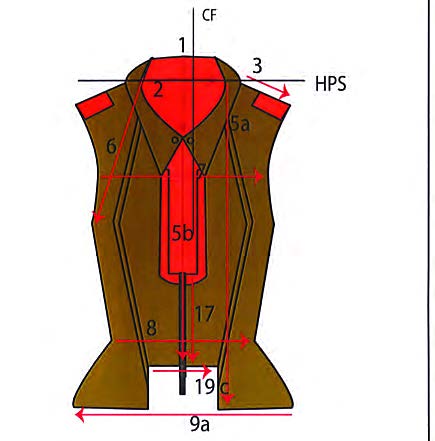
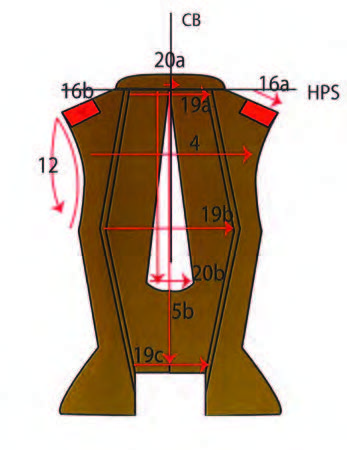
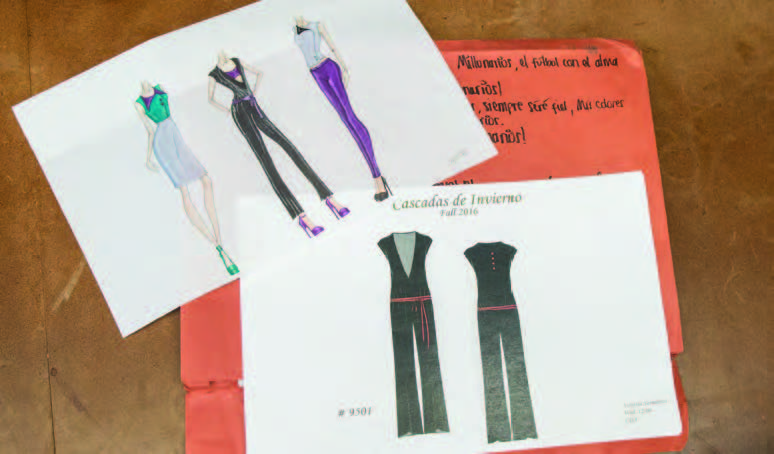

[top] Term Project; Class: Merchandising, Costing & Specification; Student: Ryo Takiguchi [bottom] Computerized Sketching Presentation; Class: Computer Drafting 1; Student: Vanessa Sarmiento
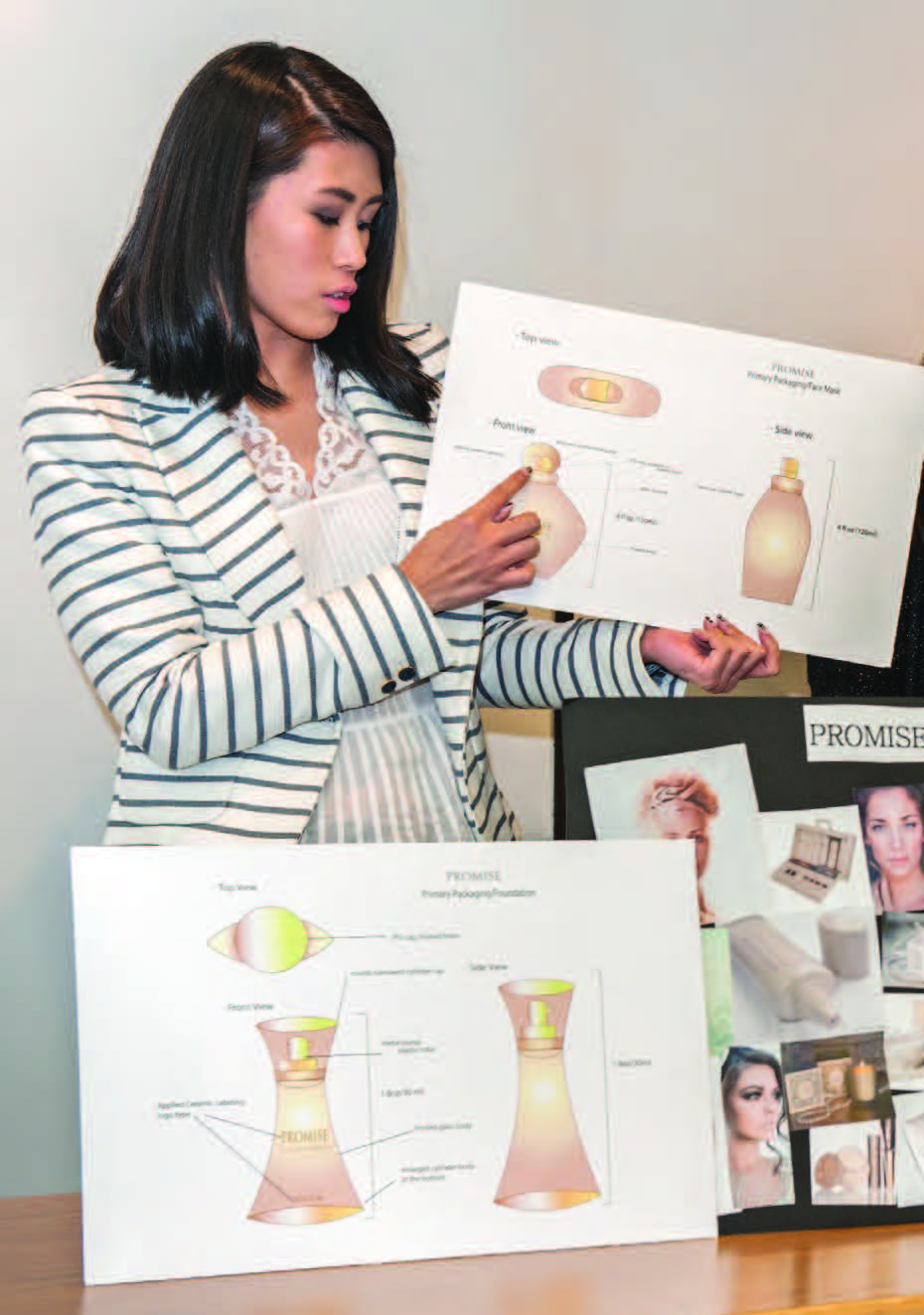
BEAUTY MARKETING & PRODUCT DEVELOPMENT
The Beauty Marketing & Product Development Program is a comprehensive curriculum that prepares students to enter the beauty industry with the knowledge of the complexities and challenges of each of the components and factors that are integral to the business of beauty. This program offers theoretical and practical disciplines that emphasize the development of creative, marketing and branding, technological, operational, and promotional strategies that affect business development and consumer behavior in the global beauty market.
What Our Students Learn In our program, students learn marketing, beauty brand management, strategic planning, and entrepreneurial skills in addition to gaining hands-on experience in product development.
Why FIDM We partner with companies such as Kiehl's Since 1851, L'Oréal, and wet n wild, who work closely with our students as they learn practical skills in a project-oriented program. Students intern with top beauty brands such as GLAMGLOW, Josie Maran, Orly, Purlisse, Smashbox, and Stila.
BEAUTY MARKETING & PRODUCT DEVELOPMENT
REQUIRED CLASSES FOR ASSOCIATE OF ARTS (A.A.) (for students without a prior college degree)
BUAD 2250 Organizational Leadership
BUAD 2850 Entrepreneurship
COSM 2250 Beauty: Brand Imaging
COSM 2350 Beauty: Fundamentals of Fragrance
COSM 2380 Beauty: Business Operations
COSM 2450 Beauty: Fundamentals of Cosmetics
COSM 2500 Beauty: Promotion & Presentation
COSM 2550 Beauty: Fundamentals of Body & Hair Care COSM 2580 Beauty: Current Industry Topics
COSM 2580 Beauty: Current Industry Topics
COSM 2650 Principles of Beauty Technology
COSM 2650 Principles of Beauty Technology COSM 2740 Business Ethics in the Beauty Industry
COSM 2830 Package Development & Production
COSM 2920 Beauty: Global Business
GNST 1040 English Composition
GNST 1230 Color & Design Theory
GNST 1450 College Mathematics
GNST 1600 Effective Speaking
GNST 1620 The Creative Process
GNST 1650 Critical Thinking
GNST 2420 Survey of Western Art II
GNST 2960 American Political & Economic History
GNST 3450 Applied Mathematics
MMKT 1550 Marketing & Brand Development
MMKT 1650 Consumer Behavior & Research
MMKT 2780 Integrated Marketing Communications
MRCH 1450 Concepts in Trend Forecasting
MRCH 1550 The Retail Environment
MRCH 1780 Digital Communication
MRCH 1950 Excel for Business Applications
SMED 1100 Introduction to Social Media
Total Units of Credit 90
REQUIRED CLASSES FOR PROFESSIONAL DESIGNATION (A.A.) (for students with a prior college degree)
BUAD 2850 Entrepreneurship
COSM 2250 Beauty: Brand Imaging
COSM 2350 Beauty: Fundamentals of Fragrance
COSM 2380 Beauty: Business Operations
COSM 2450 Beauty: Fundamentals of Cosmetics
COSM 2500 Beauty: Promotion & Presentation
COSM 2550 Beauty: Fundamentals of Body & Hair Care
COSM 2580 Beauty: Current Industry Topics
COSM 2650 Principles of Beauty Technology
COSM 2720 Beauty: Marketing/Management
COSM 2740 Business Ethics in the Beauty Industry
COSM 2830 Package Development & Production
COSM 2920 Beauty: Global Business
GNST 1620 The Creative Process
MRCH 1780 Digital Communication
SMED 1100 Introduction to Social Media
Total Units of Credit 48
For important information about the completion rate, educational debt, and earnings of students who attended this program, go to fidm.edu/go/ge/bmpd.
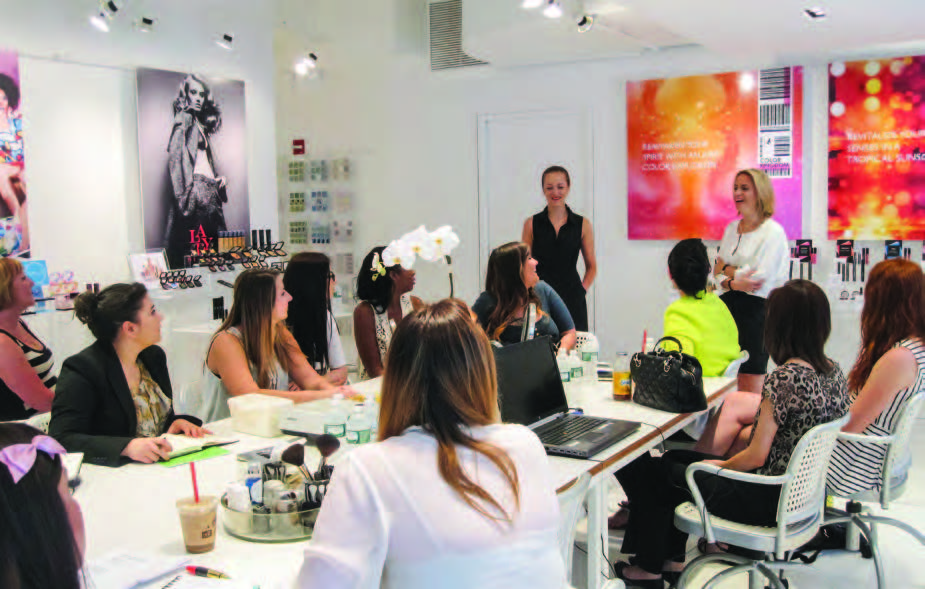

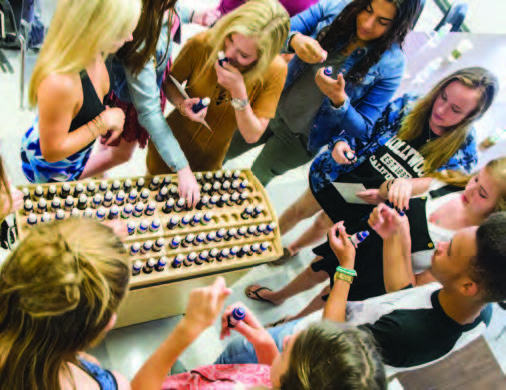
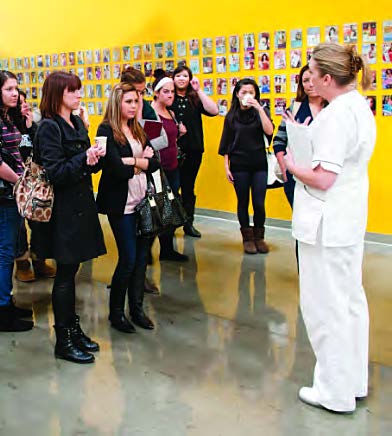
[top] Students meet with executives from top San Francisco beauty brands during a week long study tour [left] Students execute a live in-store event at Kiehl's stores; Class: Promotion & Presentation [bottom left] Students learn to evaluate fragrances as they develop their individual scents in the Fundamentals of Fragrance class [bottom right] Field Trip to Dermalogica Headquarters; Class: Fundamentals of Body & Hair Care
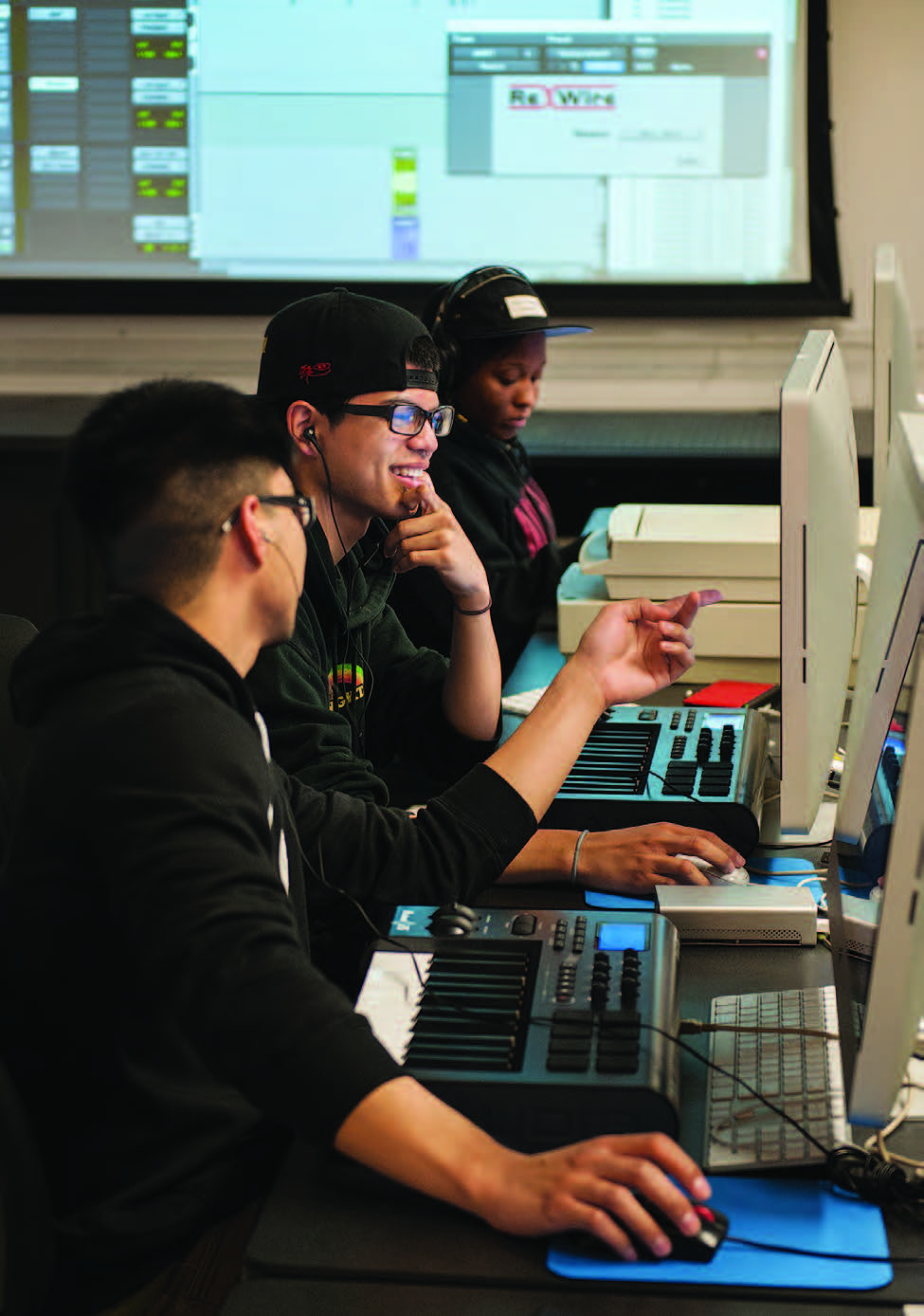
DIGITAL MEDIA
The Digital Media Program provides students with the opportunity to integrate imagination and technology. The program teaches a synergistic approach to modern technologies. Students learn to blend sight, sound, and motion seamlessly. The Program is designed to build specific skill sets that provide a strong foundation of industry knowledge. Our graduates are digital artists that have learned their craft in the context of creative expression and are prepared for specialized careers in the industry.
What Our Students Learn In our program, students learn technical skills such as editing, motion graphics, visual effects, compositing, 3-D modeling, web and app design, and more. These core skills provide the necessary foundation for their careers as digital media professionals.
Why FIDM Digital Media students have the opportunity to work on many real-world projects collaborating with companies like Trailer Park, Create, Motive Creative, CBS, Amazon Studios, and Warner Bros.
DIGITAL MEDIA
REQUIRED CLASSES FOR ASSOCIATE OF ARTS (A.A.) (for students without a prior college degree)
DIGI 1250 3-D Foundations
DIGI 1300 Editing I
DIGI 1350 Storytelling
DIGI 1550A Motion Graphics I
DIGI 1550B Motion Graphics II
DIGI 1700 Editing II
DIGI 2100 Editing III
DIGI 2150 Compositing Fundamentals
DIGI 2420 Visual Effects
DIGI 2520 Film Production
DIGI 2580 Interactive Design: App Development
DIGI 2680 Interactive Design: Web Development
DIGI 2720 Marketing for Digital Media
DIGI 2820 Intellectual Property & Law
DIGI 2950 Digital Media Portfolio
GNST 1040 English Composition
GNST 1080 Drawing Fundamentals
GNST 1230 Color & Design Theory
GNST 1600 Effective Speaking
GNST 1650 Critical Thinking
GNST 2020 Survey of Western Art I
GNST 2420 Survey of Western Art II
GNST 2960 American Political & Economic History
GNST 3410 History & Development for Film & Television
GRPH 1050 Digital Imaging
GRPH 1150 Type & Layout
GRPH 1300 Computer Illustration
GRPH 1420 2-D Design
GRPH 1720 Typography
GRPH 2780 Introduction to Digital Photography
Total Units of Credit 90
REQUIRED CLASSES FOR PROFESSIONAL DESIGNATION (A.A.) (for students with a prior college degree)
DIGI 1250 3-D Foundations
DIGI 1300 Editing I
DIGI 1350 Storytelling
DIGI 1550A Motion Graphics I
DIGI 1550B Motion Graphics II
DIGI 1700 Editing II
DIGI 2100 Editing III
DIGI 2150 Compositing Fundamentals
DIGI 2420 Visual Effects
DIGI 2520 Film Production
DIGI 2580 Interactive Design: App Development
DIGI 2680 Interactive Design: Web Development
DIGI 2720 Marketing for Digital Media
DIGI 2820 Intellectual Property & Law
DIGI 2950 Digital Media Portfolio
GNST 2780 Major Art Movements
GNST 3410 History & Development for Film & Television
GRPH 1420 2-D Design
GRPH 1720 Typography
GRPH 2780 Introduction to Digital Photography
Total Units of Credit 60
Acceptance to the Professional Designation program is contingent upon documented proficiency in Photoshop and Illustrator.
For important information about the completion rate, educational debt, and earnings of students who attended this program, go to fidm.edu/go/ge/dm.
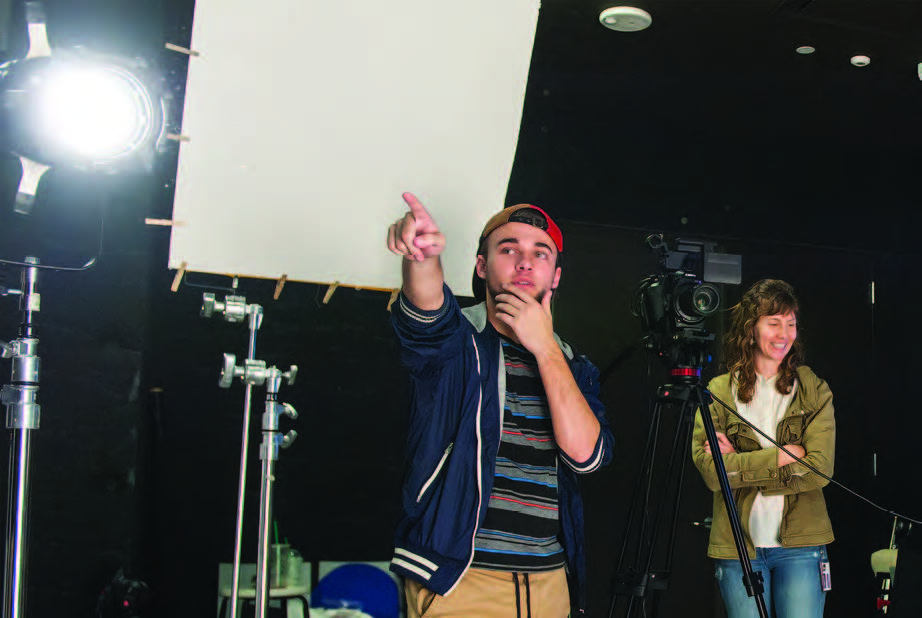
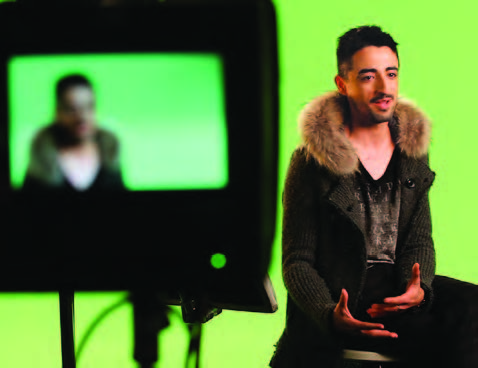
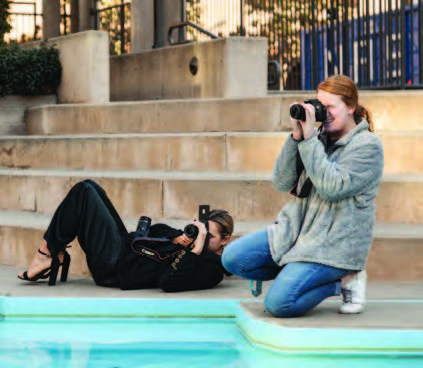
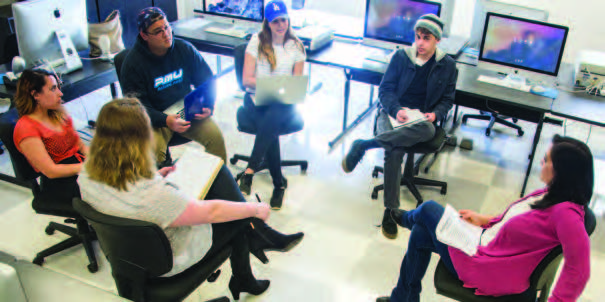
[top] Students study lighting techniques; Class: Film Production [middle] Students practice film production techniques and digital photography; Classes: Film Production; Introduction to Digital Photography [bottom] Students learn about intellectual property in the industry; Class: Intellectual Property & Law
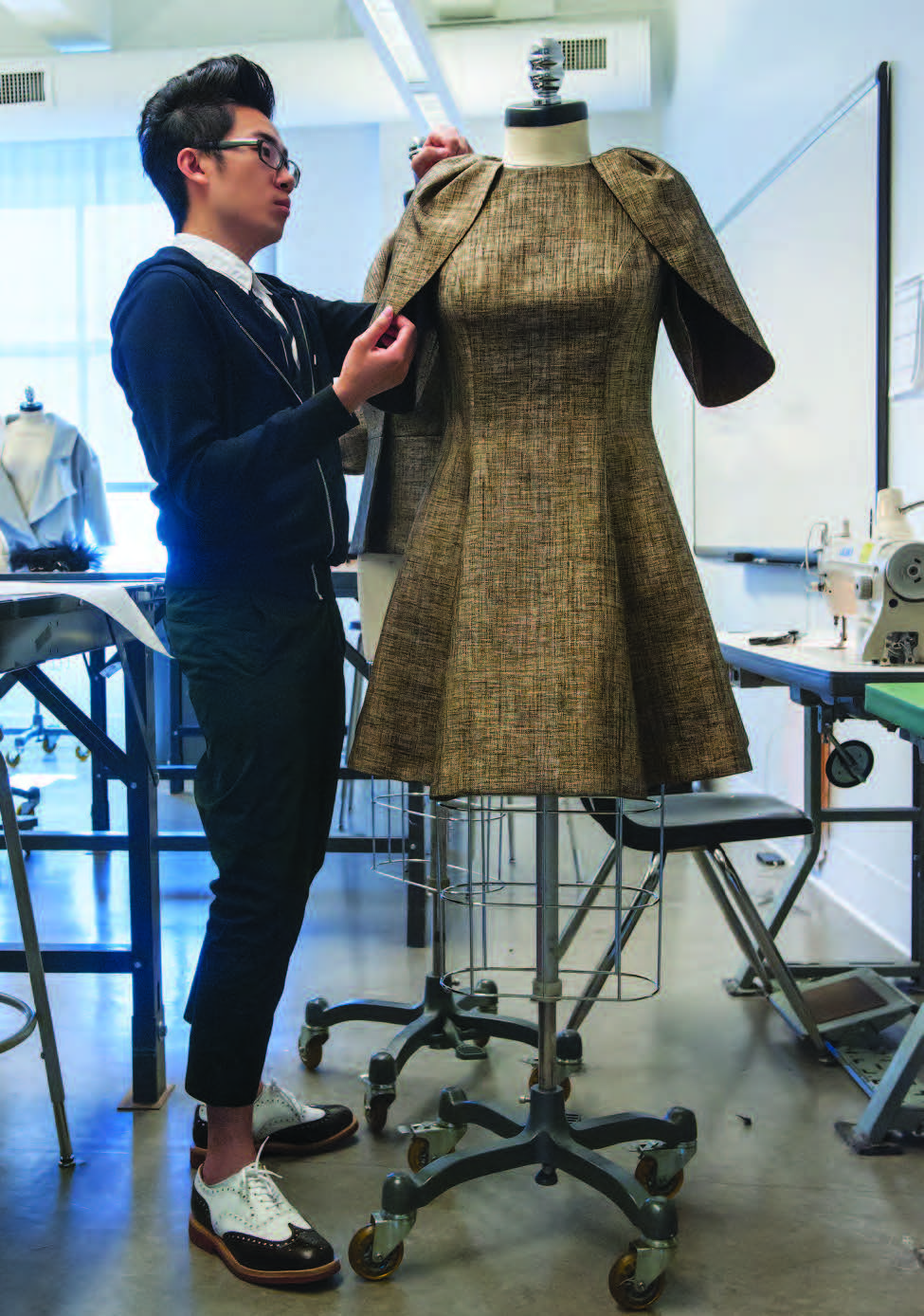
FASHION DESIGN
The Fashion Design Program prepares students for careers in fashion design for the apparel industry. The curriculum stimulates creative expression in all aspects of fashion design, including fashion sketching, creative design, computer applications, draping, pattern drafting, and textile knowledge. Students will understand the importance of communication and critical reasoning and the effect they have on this diversified and global industry. The program is structured to challenge and inspire students by incorporating artistic, technical, and theoretical elements into a realistic approach to the fashion design industry.
What Our Students Learn In our program, students learn skills such as fashion sketching, draping, and pattern drafting through hands-on experience. They also learn programs such as Adobe Photoshop and Illustrator. Students gain an understanding of the theories of fashion and abstract and critical thinking.
Why FIDM FIDM offers a unique career-oriented and reality-based Fashion Design program taught by industry professionals. The program teaches students how to develop their own unique vision. Students leave the program with a portfolio that includes traditional sketches and Computer-Aided Design (CAD) sketches. They also learn to create Tech Packs, that include Spec Sheets, Cost Sheets, and Line Sheets.
FASHION DESIGN
REQUIRED CLASSES FOR ASSOCIATE OF ARTS (A.A.) (for students without a prior college degree)
DESN 1150 Fashion Sketching for Design I
DESN 1250 Industry Sewing
DESN 1420 Applied Draping Techniques (6 hours)*
DESN 1550 Fashion Sketching for Design II
DESN 1760 Pattern Drafting I (6 hours)*
DESN 1850 The Business of Fashion
DESN 2160 Pattern Drafting II (6 hours)*
DESN 2280 Creative Design Applications
DESN 2530 Computer-Aided Fashion Design I
DESN 2540 Computer Pattern Drafting I
DESN 2560 Pattern Drafting III (6 hours)*
DESN 2680 Creative Design Analysis & Collection Development
DESN 2700 Collection Development (6 hours)*
DESN 2840 Computer Pattern Drafting II
DESN 2980 Portfolio Preparation & Presentation
GNST 1040 English Composition
e G
GNST 1230 Color & Design Theory
e G
GNST 1450 College Mathematics
g Critical Thinking G
g GNST 1600 G
GNST 2020 GNST 2420 GNST 2980 Survey of Western Art I
GNST 2420 GNST 2980 Survey of Western Art I Survey of Western Art II
GNST 2960 American Political & Economic History
GNST 2980 Survey of Western Art I Survey of Western Art II GNST 2960 American Political & Economic History Professional Practices
MFTG 2330 Computer Grading, Marking & Cutting
MPDV 1800 Fundamentals of Sketching
n M
TSCI 1800 Fabric Identification
Total Units of Credit 90
REQUIRED CLASSES FOR PROFESSIONAL DESIGNATION (A.A.) (for students with a prior college degree)
DESN 1150 Fashion Sketching for Design I
g D
DESN 1420 Applied Draping Techniques (6 hours)*
DESN 1550 Fashion Sketching for Design II
DESN 1760 Pattern Drafting I (6 hours)*
DESN 1850 The Business of Fashion
DESN 2160 Pattern Drafting II (6 hours)*
DESN 2280 Creative Design Applications
DESN 2530 Computer-Aided Fashion Design I
DESN 2560 Pattern Drafting III (6 hours)*
DESN 2680 Creative Design Analysis & Collection Development
DESN 2700 Collection Development (6 hours)*
DESN 2980 Portfolio Preparation & Presentation
GNST 1440 Textile Science
MFTG 2560 Computer Pattern Drafting, Grading & Marking
MPDV 1800 Fundamentals of Sketching
Digital Design MPDV 2200
TSCI 1800 Fabric Identification
Total Units of Credit 54
*Three (3)-hour lab included in 6 hours
For important information about the completion rate, educational debt, and earnings of students who attended this program, go to fidm.edu/go/ge/fd.

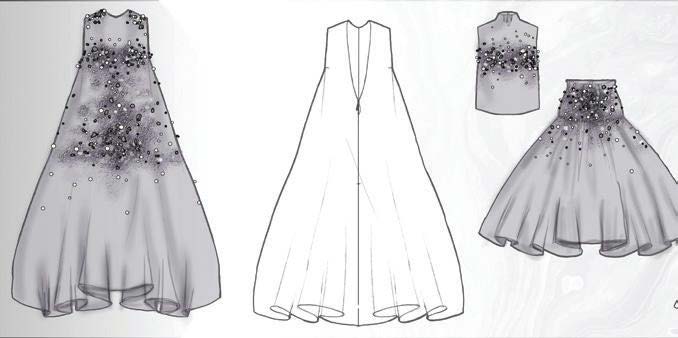
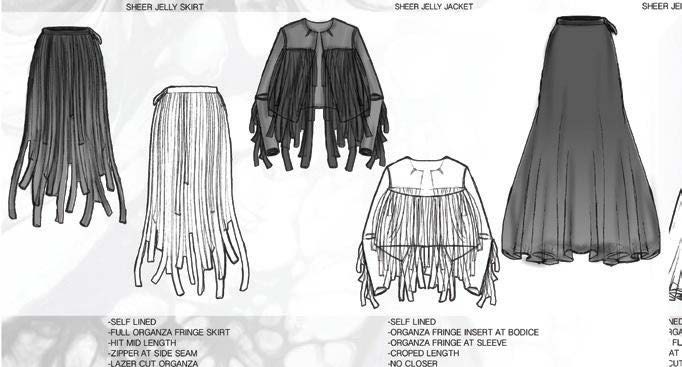
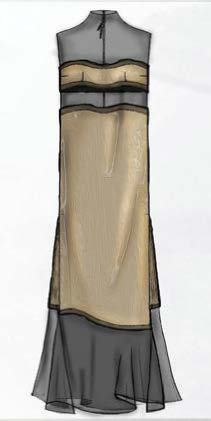
[from top to bottom] Illustrations of a final portfolio collection; Class: Portfolio Preparation & Presentation; Student: Duston Jasso (recipient of the GUESS?, Inc., scholarship)
The Footwear Design & Development Program prepares students for careers in the global footwear industry. It offers students the opportunity to integrate critical and creative thought and technical skills. Students explore how construction, technology, sustainability, cultural diversity, and aesthetics influence design.
What Our Students Learn In our program, students learn how to design coherent, on-trend footwear collections for today's global and domestic markets.
Why FIDM Students learn from instructors with extensive industry experience, as well as guest speakers representing every segment of the industry. On-site visits to working factories, sample rooms, and key footwear retailers give students practical knowledge of a range of footwear and industry trends. Recent collaborations include: Just Fab, Seychelles, Skechers, PV Footwear/Sbicca, Sam Edelman, TOMS, and Steve Madden.
FOOTWEAR DESIGN & DEVELOPMENT
REQUIRED CLASSES FOR ASSOCIATE OF ARTS (A.A.) (for students without a prior college degree)
FTWR 1100 Introduction to Footwear Design
FTWR 1300 Sketching for Footwear Design
FTWR 1700 Technical Sketching for Footwear Design
FTWR 1800 History of Footwear
TWR 2300 Pattern Drafting for Footwear (6 hours)*
FTWR 2400 Introduction to 3-D Design
FTWR 2500A Design & Technical Specification for Footwear I
FTWR 2500B Design & Technical Specification for Footwear II
FTWR 2700 3-D Design Applications
FTWR 2800 Collection Development
FTWR 2850 Special Projects in Footwear
GNST 1040 English Composition
GNST 1170 History of Costume
GNST 1230 Color & Design Theory
GNST 1440 Textile Science
GNST 1450 College Mathematics
GNST 1600 Effective Speaking
GNST 1650 Critical Thinking
GNST 2220 History of Design
GNST 2380 World Art
GNST 2750 Seminar in the Arts
GNST 2960 America Political & Economics History
MTFG 2520 Global Trade Dynamics
MMKT 1550 Marketing & Brand Development
MPDV 1750 Trends & Fashion Forecasting
MPDV 2700 Classification & Line Development
MRCH 1550 Retail Environment
MRCH 1950 Excel for Business Applications
TEXT 2220 Introduction to Photoshop
TEXT 2240 Introduction to Illustrator
Total Units of Credit 90
REQUIRED CLASSES FOR PROFESSIONAL DESIGNATION (A.A.) (for students with a prior college degree)
FTWR 1100 Introduction to Footwear Design
FTWR 1300 Sketching for Footwear Design
FTWR 1700 Technical Sketching for Footwear Design
FTWR 1100 Introduction to Footwear
FTWR 2300 Pattern Drafting for Footwear (6 hours)*
FTWR 1100 Introduction to Footwear Design
FTWR 2500A Design & Technical Specification for Footwear I
FTWR 2500B Design & Technical Specification for Footwear II
FTWR 1100 Introduction to Footwear Design
FTWR 1100 Introduction to Footwear Design
FTWR 2850 Special Projects in Footwear
FTWR 1100 Introduction to Footwear
FTWR 1100 Introduction to Footwear Design
FTWR 1100 Introduction to Footwear
FTWR 1100 Introduction to Footwear Design
MPDV 1750 Trends & Fashion Forecasting
FTWR 1100 Introduction to Footwear Design
FTWR 1100 Introduction to Footwear Design
TEXT 2220 Introduction to Photoshop
FTWR 1100 Introduction to Footwear Design
Total Units of Credit 90
*Three (3)-hour lab included in 6 hours For important information about the completion rate, educational debt, and earnings of students who attended this program, go to fidm.edu/go/ge/fdd.
For important information about the completion rate, educational debt, and earnings of students who attended this program. go to http://fidm.edu/go/ge/fdd.
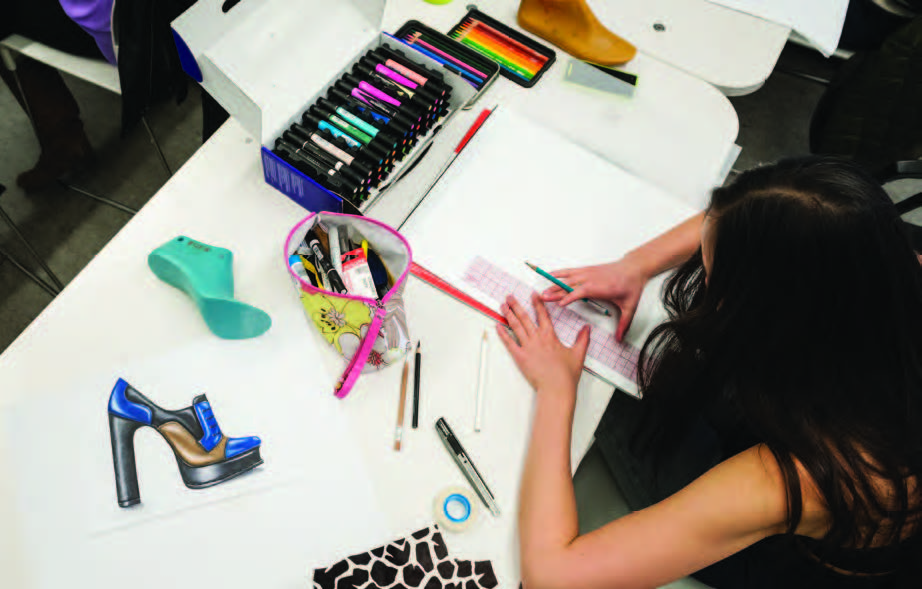
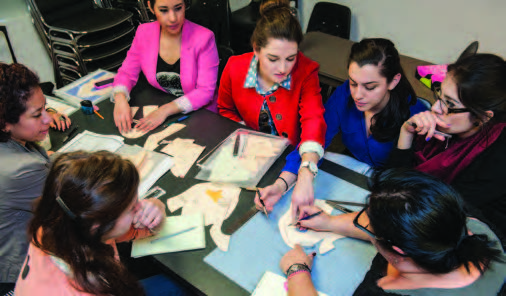
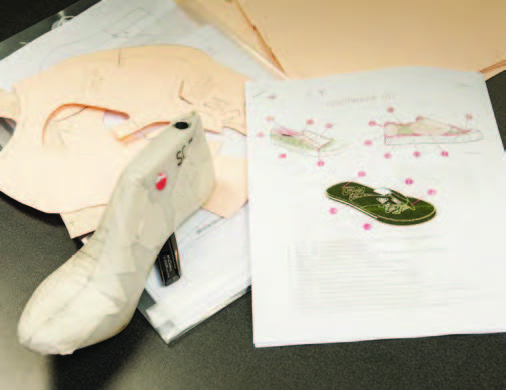
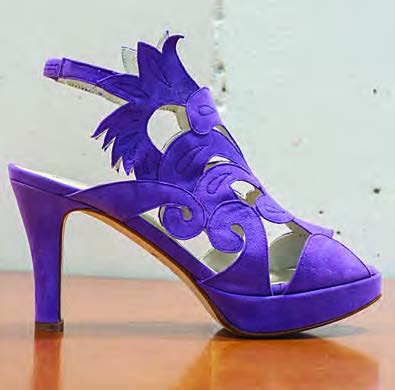
[top] Starting the creative process of shoe designing; Class: Sketching for Footwear Design [left] Students discuss the process of creating a shoe [bottom left] Students design using a "last" [bottom right] Sample of a final product. Student: Stephanie Wong
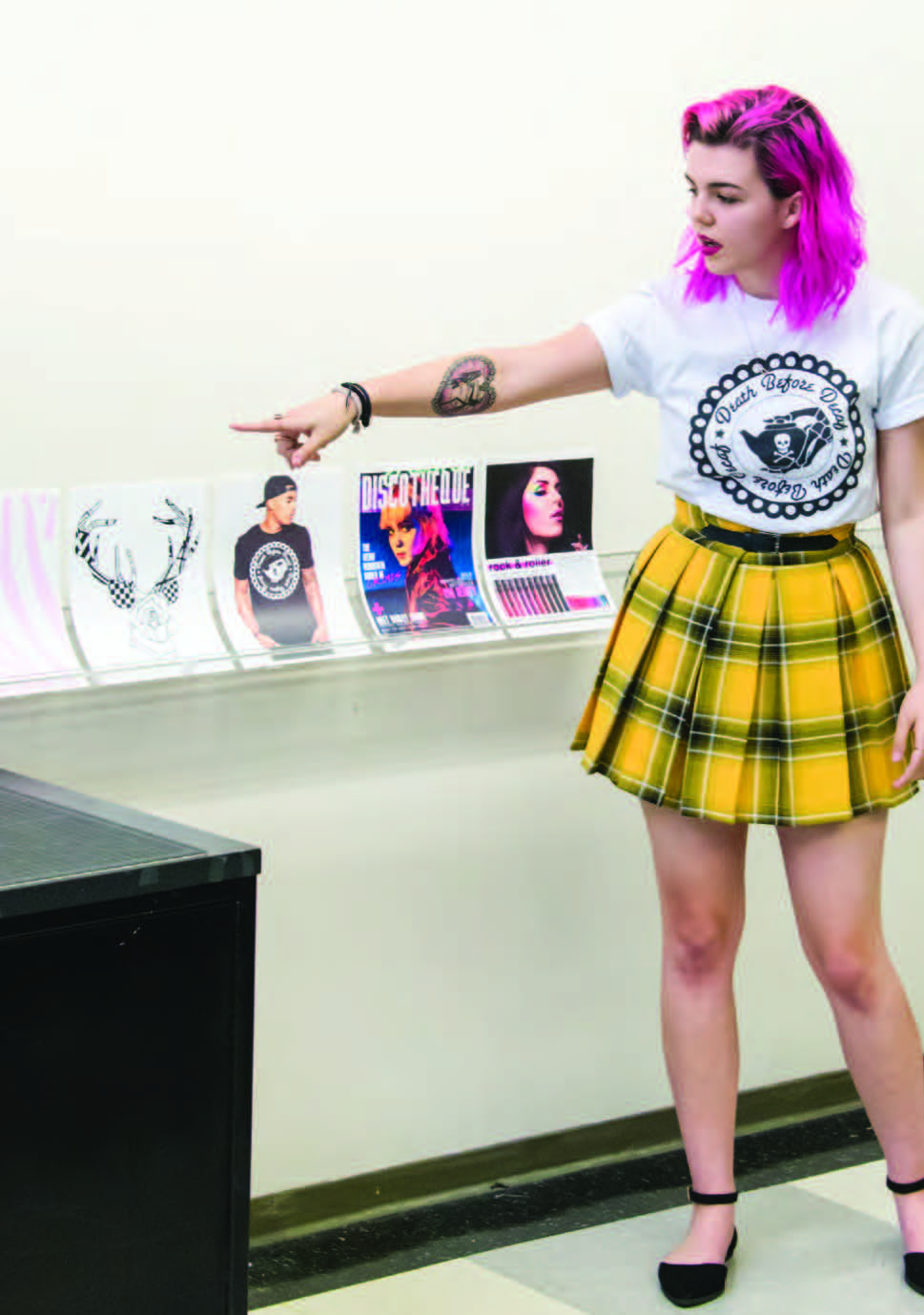
GRAPHIC DESIGN
GRAPHIC DESIGN The Associate of Arts in Graphic Design Program prepares students for careers as graphic artists and designers. Students learn how to interpret, define, and solve client problems and create a distinct voice of communication to the target audience. Using a combination of technical skills and creative thinking, this comprehensive program teaches students about concept, design, typography, and motion graphics and how these elements are combined and used in graphic designs for the fashion and entertainment industries.
What Our Students Learn In our program, students learn how to create and present strong visuals that communicate a brand's marketing message.
Why FIDM With a broad focus on fashion and entertainment industries, our Graphic Design program aides students in developing a professional portfolio of their work.
Instructors are working professionals with exciting careers and industry connections. These industry execs from top advertising and marketing firms offer hands-on instruction and mentoring in the classroom. Students learn how to concept, execute, and pitch ideas. They leave the program ready to design for every platform – from mobile and web to the printed page – with user experience a primary focus.
GRAPHIC DESIGN
REQUIRED CLASSES FOR ASSOCIATE OF ARTS (A.A.) (for students without a prior college degree)
GNST 1040 English Composition
GNST 1080 Drawing Fundamentals
GNST 1230 Color & Design Theory
GNST 1450 College Mathematics
GNST 1600 Effective Speaking
GNST 1650 Critical Thinking
GNST 2020 Survey of Western Art I
GNST 2220 History of Design
GNST 2420 Survey of Western Art II
GNST 2960 American Political & Economic History
GNST 2980 Professional Practices
GRPH 1050 Digital Imaging
GRPH 1150 Type & Layout
GRPH 1300 Computer Illustration
GRPH 1420 2-D Design
GRPH 1500 Critical Concepts
GRPH 1500 Critical Concepts GRPH 1720 Typography GRPH 2050 Brand X
GRPH 2050 Brand X GRPH 2120 Publication De
GRPH 2120 Publication Design
GRPH 2230 UX Design
GRPH 2300 Prepress Production
GRPH 2380 Packaging Design
GRPH 2400 Graphics/Licensing (6 hours)* GRPH 2500 Logo/Symbol Design
RPH 2500 Logo/Symbol Design
GRPH 2540 Applied Branding
GRPH 2630 Website Design
GRPH 2680 Graphic Design Portfolio
GRPH 2780 Introduction to Digital Photography
GRPH 2930 Advanced Website Design
MMKT 1550 Marketing & Brand Development
REQUIRED CLASSES FOR PROFESSIONAL DESIGNATION (A.A.) (for students with a prior college degree)
GNST 1080 Drawing Fundamentals
GNST 2220 History of Design
GNST 2420 Survey of Western Art II
GRPH 1050 Digital Imaging
GRPH 1150 Type & Layout
GRPH 1300 Computer Illustration
GRPH 1420 2-D Design
GRPH 1500 Critical Concepts
GRPH 1720 Typography
GRPH 2050 Brand X
GRPH 2120 Publication Design
GRPH 2230 UX Design
GRPH 2300 Prepress Production
GRPH 2380 Packaging Design –or–
GRPH 2930 Advanced Website Design
GRPH 2400 Graphics/Licensing (6 hours)*
GRPH 2500 Logo/Symbol Design
GRPH 2540 Applied Branding
GRPH 2630 Website Design
GRPH 2680 Graphic Design Portfolio
GRPH 2780 Introduction to Digital Photography
Total Units of Credit 60
Total Units of Credit 90
*Three (3)-hour lab included in 6 hours
For important information about the completion rate, educational debt, and earnings of students who attended this program, go to fidm.edu/go/ge/gd.

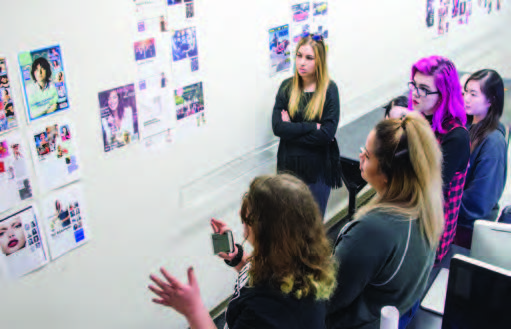
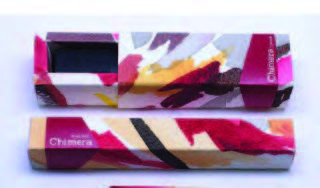

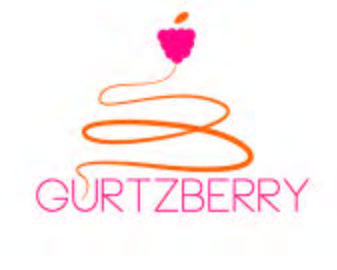

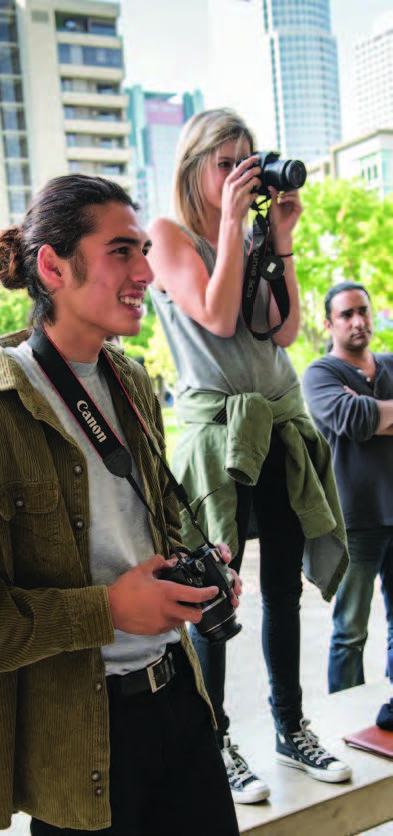
(top left) Merchandise concepts for re-release of the band Genesis; Class: Brand X (bottom left) Student photographers; Class: Intro to Digital Photography (middle right/from top to bottom) Cosmetic packaging prototypes Class: Packaging Design (bottom) Students discuss print layouts; Class: Publication Design

INTERIOR DESIGN
The Interior Design Program combines theoretical elements of interior design with practical creative approaches to the solution of functional and aesthetic design problems in the living, working, and recreational human environment. Competencies developed by the program include architectural drafting, CAD illustration and graphic presentation skills, and design proficiency. Students will also develop a working knowledge of the materials, resources, and business procedures pertaining to the interior design profession. Completion of the curriculum satisfies the educational requirement for professional membership in ASID (American Society of Interior Designers) and IIDA (International Interior Design Association) and enables students to qualify for the NCIDQ (National Council for Interior Design Qualification) examination.
What Our Students Learn In our program, students learn the fundamental creative and practical skills necessary to become a professional Interior Designer.
Why FIDM Design projects take Interior Design students into the community to foster relationships within a professional design setting. Students have created the lobby design for Elleven Lofts and presented design concepts to IPME / International Port Management Enterprise using shipping containers for customized residential and commercial projects. Chairing Styles, an exciting collaboration between Interior Design, Fashion Design, and Textile Design students, in cooperation with major furniture manufacturers, fosters new relationships between education and industry.
INTERIOR DESIGN
REQUIRED CLASSES FOR ASSOCIATE OF ARTS (A.A.) (for students without a prior college degree)
GNST 1040 English Composition
GNST 1230 Color & Design Theory
GNST 1420 Historic Textiles
GNST 1450 College Mathematics
GNST 1600 Effective Speaking
GNST 1620 The Creative Process
GNST 1650 Critical Thinking
GNST 2080 Human Factors in Design
GNST 2960 American Political & Economic History
INTD 1000A Sketching Techniques I
INTD 1000B Sketching Techniques II
INTD 1090A Technical Drawing I
INTD 1090B Technical Drawing II
INTD 1090C Technical Drawing III
INTD 1220 Design Process
INTD 1350 Survey of Architecture & Interior Design I
INTD 1450 Residential Design Concepts
NTD 1480 Computer Graphics I
INTD 1650 Survey of Architecture & Interior Design II
INTD 1850 Commercial Design Concepts
INTD 1880 Computer Graphics II
INTD 2000 Lighting Design
INTD 2050 Materials for Interior Design
INTD 2810 Computer Graphics III
INTD 2830 Interior Design Thesis
INTD 2930 Business Practices for Interior Design
INTD 2980 Presentation & Portfolio
INTD Elective: (1) three-unit course
TSCI 1750 Textile Science for Interior Design
Total Units of Credit 90
REQUIRED CLASSES FOR PROFESSIONAL DESIGNATION (A.A.) (for students with a prior college degree)
GNST 1230 Color & Design Theory
GNST 2080 Human Factors in Design
INTD 1000A Sketching Techniques I
INTD 1000B Sketching Techniques II
INTD 1090A Technical Drawing I
INTD 1090B Technical Drawing II
INTD 1090C Technical Drawing III
INTD 1220 Design Process
INTD 1350 Survey of Architecture & Interior Design I
INTD 1450 Residential Design Concepts
INTD 1480 Computer Graphics I
INTD 1650 Survey of Architecture & Interior Design II
INTD 1850 Commercial Design Concepts
INTD 1880 Computer Graphics II
INTD 2000 Lighting Design
INTD 2050 Materials for Interior Design
INTD 2810 Computer Graphics III
INTD 2830 Interior Design Thesis
INTD 2930 Business Practices for Interior Design
INTD 2980 Presentation & Portfolio
TSCI 1750 Textile Science for Interior Design
Total Units of Credit 66
For important information about the completion rate, educational debt, and earnings of students who attended this program, go to fidm.edu/go/ge/id.
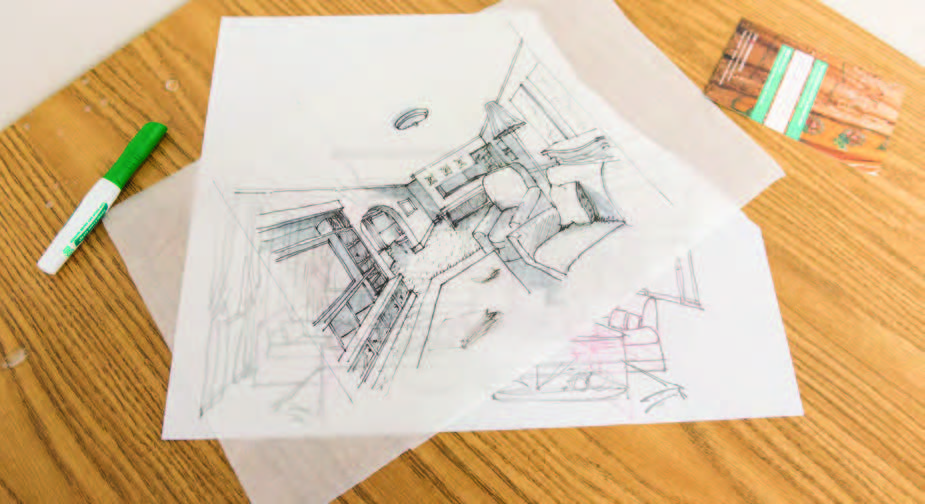
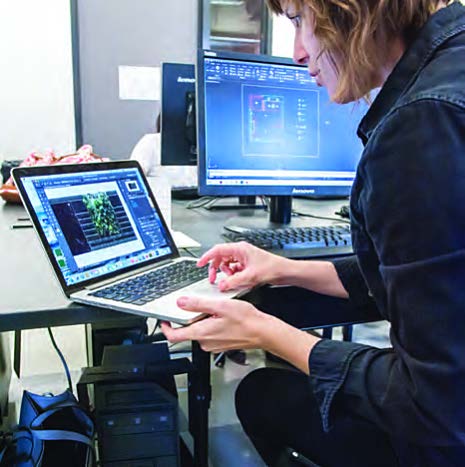

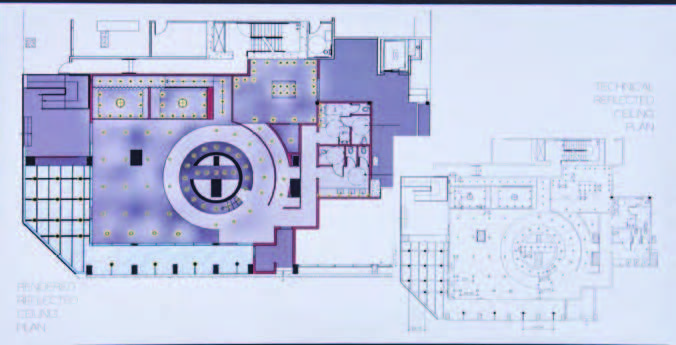
[top] Student Concept sketches; Class: Sketching I [middle left] Class: Commercial Design Concepts, [middle right] Chairing Styles: a collaboration between interior, fashion and textile design students. "Swoon" Chair (chair name) Student: Leslie Frausto [bottom] Technical Drawing Class: Lighting Design
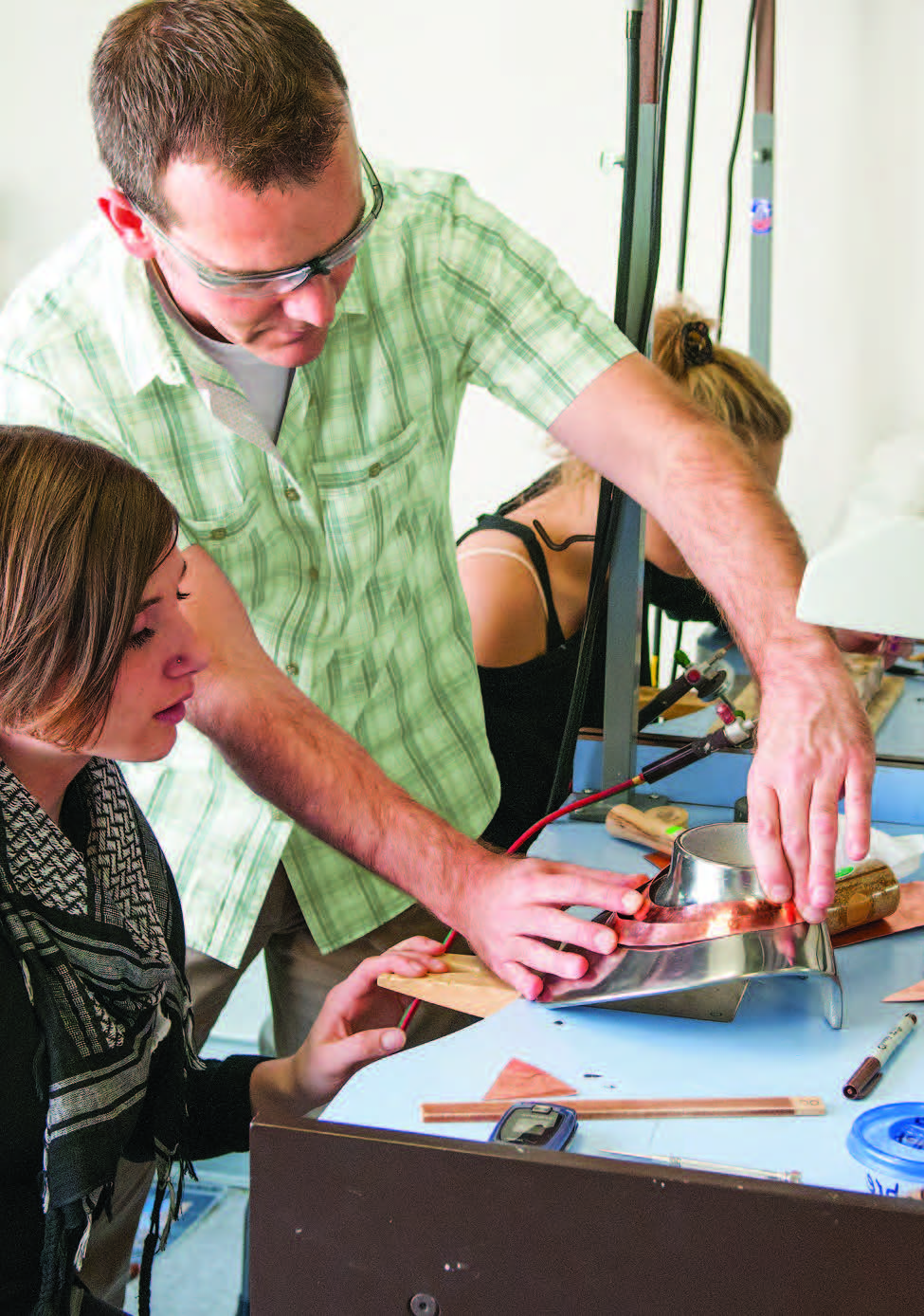
JEWELRY DESIGN
The Jewelry Design Program provides students with a broad understanding of the jewelry industry through in-depth study of the creative process, jewelry styles, and the technical properties of metals and gems.
What Our Students Learn In our program, students learn how to design, produce, and market functional and wearable jewelry by providing in-depth knowledge of both the creative and manufacturing processes involved in jewelry making.
Why FIDM FIDM's Jewelry Design program is uniquely positioned to link jewelry design to fashion and has the benefit of FIDM's incredible network of fashion industry connections. FIDM's custom-designed, state-of-the-industry Jewelry Design Studio is located in the heart of Los Angeles's Jewelry District, one of the largest in the world.
The program features an in-depth study of Jewelry Design past and present, so students have an artistic and historical context for their work. Instructors are creative professionals in the industry. Consulting Jewelry Designer Kim Hurlbert, a graduate of Gemological Institute of America and Gemological Association of Great Britain, helped launch the program.
JEWELRY DESIGN
REQUIRED CLASSES FOR ASSOCIATE OF ARTS (A.A.) (for students without a prior college degree)
GNST 1040 English Composition
GNST 1200 20th Century Designers
GNST 1230 Color & Design Theory
GNST 1450 College Mathematics
GNST 1520 Gemology
GNST 1560 History of Jewelry
GNST 1600 Effective Speaking
GNST 1650 Critical Thinking
GNST 2020 Survey of Western Art I
GNST 2960 American Political & Economic History GNST 2980 Professional Practices
GNST 2980 Professional Practices
DSN 1100 Material & Methods for Jewelry Manufacturing
JDSN 1200 Rendering I
JDSN 1400 Rendering II
JDSN 1500 Introduction to Computer-Aided Design
JDSN 1600 Metalsmithing I
JDSN 1700 Wax Carving & Casting
JDSN 1800 Metalsmithing II
JDSN 1850 Business of Jewelry Design
JDSN 1900 Creative Design for Jewelry I
JDSN 2100 Computer-Aided Jewelry Design I
JDSN 2200 Metalsmithing III
JDSN 2300 Creative Design for Jewelry II
JDSN 2500 Computer-Aided Jewelry Design II
JDSN 2700 Creative Design for Jewelry III
JDSN 2950 Sample Case Development & Presentation
Total Units of Credit 90
REQUIRED CLASSES FOR PROFESSIONAL DESIGNATION (A.A.) (for students with a prior college degree)
GNST 1200 20th Century Designers
GNST 1520 Gemology
GNST 1560 History of Jewelry
g JDSN 1200 Rendering I
JDSN 1200 Rendering I
JDSN 1400 Rendering II
JDSN 1500 Introduction to Computer-Aided Design
JDSN 1600 Metalsmithing I
JDSN 1700 Wax Carving & Casting
JDSN 1800 Metalsmithing II
JDSN 1850 Business of Jewelry Design
JDSN 1900 Creative Design for Jewelry I
JDSN 2100 Computer-Aided Jewelry Design I
JDSN 2200 Metalsmithing III
JDSN 2300 Creative Design for Jewelry II
JDSN 2500 Computer-Aided Jewelry Design II
JDSN 2700 Creative Design for Jewelry III
JDSN 2950 Sample Case Development & Presentation
Total Units of Credit 66
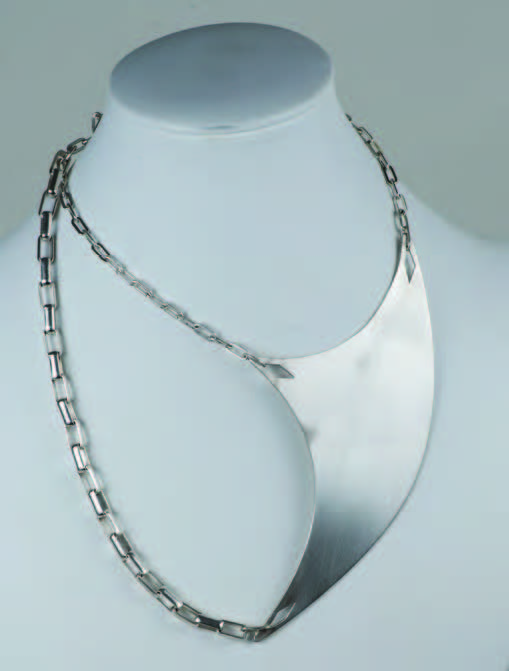
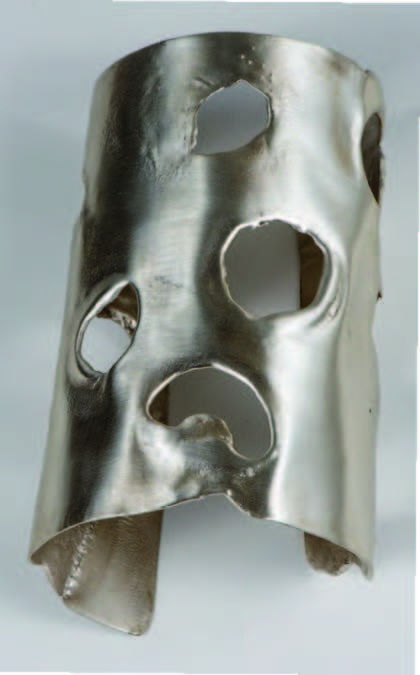

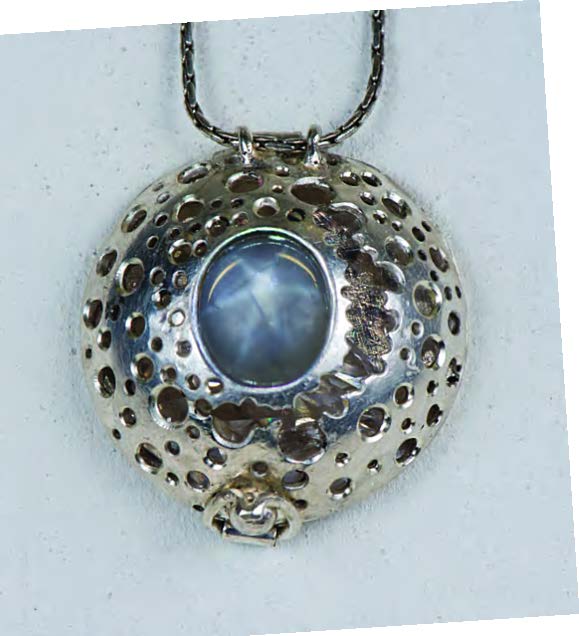
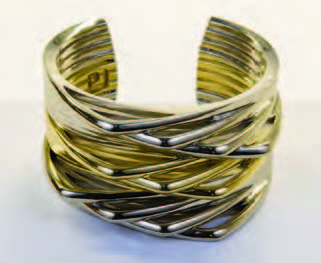
[top left] Silver cuff bracelet; Class: Creative Design for Jewelry II; Student: Danielle Samuels [top right] Silver necklace; Class: Creative Design for Jewelry II; Student: Danielle Samuels [bottom left] Silver necklace set with a star sapphire; Class: Creative Design for Jewelry III; Student: Bevelyn Esparza [bottom right] Gold & silver cuff; Class: Computer-Aided Jewelry Design II; Student: Zoe Hung
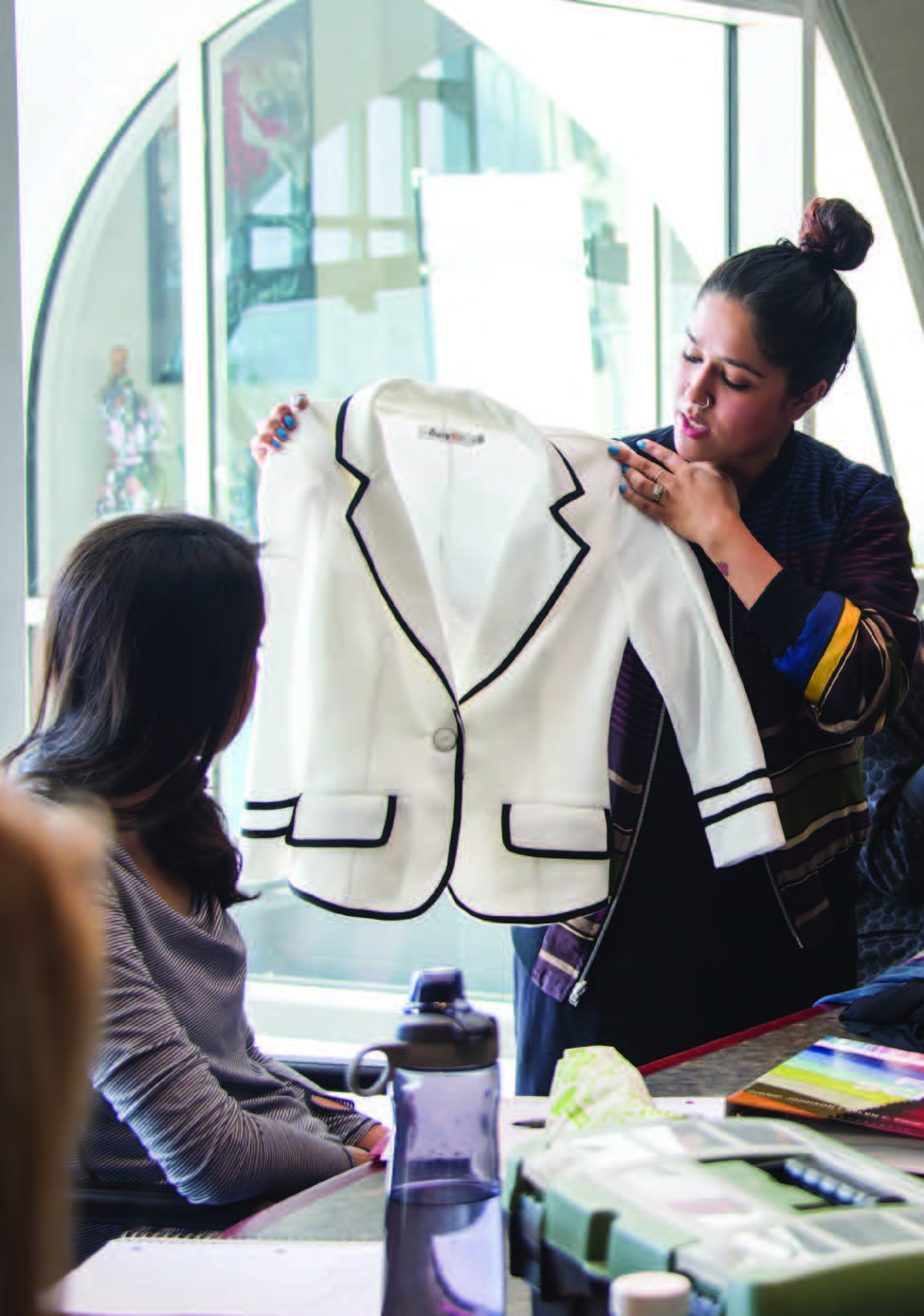
MERCHANDISING & MARKETING
The Merchandising & Marketing Program prepares students for a wide range of careers in the global fields of fashion merchandising, marketing, and brand management. The curriculum emphasizes the development of creative, financial, technological, buying and promotional strategies that affect consumer behavior in the digital era. Core values of the program include critical thought, leadership, teamwork, management, and effective communication.
What Our Students Learn In our program, students learn how to critically evaluate information and create effective business strategies and solutions regarding the marketing, buying, and management of merchandise with an emphasis in the retail industry.
Why FIDM As the retail industry evolves into a stronger digital environment, the Merchandising & Marketing curriculum prepares students for a wide variety of business careers within the omni-channel environment. Along with instructors with industry experience, frequent business professionals and alumni guest speakers bring the business of fashion to the classroom. Additionally, field trips into the marketplace enhance the education experience. These unique opportunities give the students inside perspectives and valuable networking connections. Students graduate from the program with the necessary skills that showcase their readiness to begin careers in merchandising, buying, marketing, and management.
MERCHANDISING & MARKETING
REQUIRED CLASSES FOR ASSOCIATE OF ARTS (A.A.) (for students without a prior college degree)
GNST 1040 English Composition
GNST 1200 20th Century Designers
GNST 1230 Color & Design Theory
GNST 1450 College Mathematics
GNST 1600 Effective Speaking
GNST 1650 Critical Thinking
GNST 2960 American Political & Economic History
GNST 2980 Professional Practices
MMKT 1650 Consumer Behavior and Research
MMKT 2080 Brand Management Strategies
MMKT 2420 Marketing Communications
MMKT 2780 Integrated Marketing Communications
MMKT 2880 Marketing Essentials
MRCH 1100 The Business of Fashion Merchandising
MRCH 1420 Textiles & Product Analysis
MRCH 1550 The Retail Environment
MRCH 1700 Merchandise Math
MRCH 1750 Merchandising Strategies
MRCH 1750 Merchandising Strategies MRCH 1780 Digital Communication
MRCH 1820 Trend Analysis & Styling Concepts
MRCH 1950 Excel for Business Applications
MRCH 2210 Merchandise Presentation Strategies
MRCH 2200 Merchandise Buying
MRCH 2420 Global Supply Chain & Logistics
MRCH 2700 Applied Buying –or–
BUAD 2250 Organizational Leadership
MRCH 2760 Advanced Business Applications
MRCH 2860 Merchandise Planning & Allocation –or–
BUAD 2850 Entrepreneurship
MRCH 2980 Contemporary Business Strategies
SMED 1100 Introduction to Social Media
SMED 2750 E-Commerce Marketing
Total Units of Credit 90
REQUIRED CLASSES FOR PROFESSIONAL DESIGNATION (A.A.) (for students with a prior college degree)
BUAD 2850 Entrepreneurship –or–
MRCH 2420 Global Supply Chain & Logistics
MMKT 2080 Brand Management Strategies
MMKT 2420 Marketing Communications
MMKT 2780 Integrated Marketing Communications
MRCH 1420 Textiles & Product Analysis
MRCH 1700 Merchandise Math
MRCH 1750 Merchandising Strategies
MRCH 1820 Trend Analysis & Styling Concepts
MRCH 1950 Excel for Business Applications
MRCH 2200 Merchandise Buying
MRCH 2700 Applied Buying
MRCH 2760 Advanced Business Applications
MRCH 2860 Merchandise Planning & Allocation
MRCH 2980 Contemporary Business Strategies
SMED 2750 E-Commerce Marketing
Total Units of Credit 45
For important information about the completion rate, educational debt, and earnings of students who attended this program, go to fidm.edu/go/ge/mm.
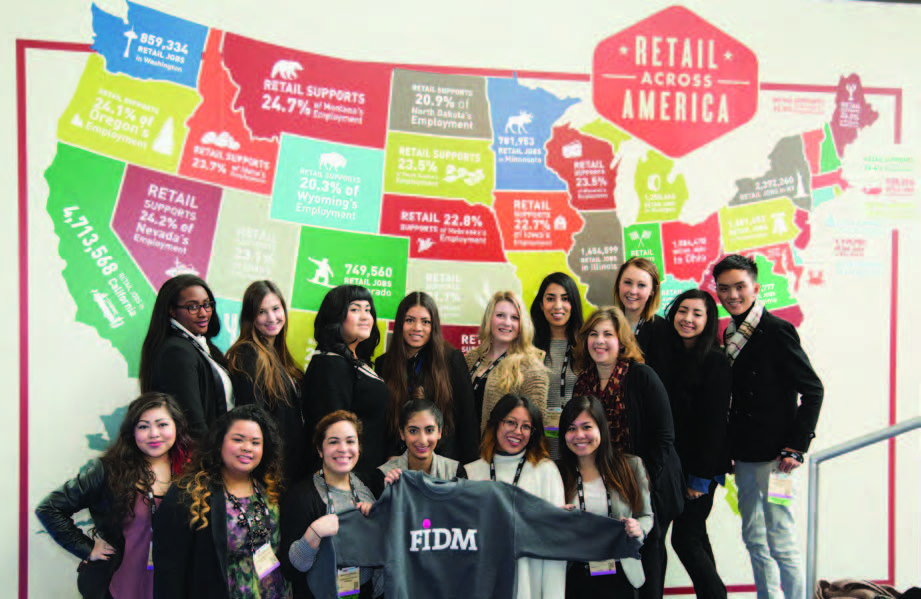
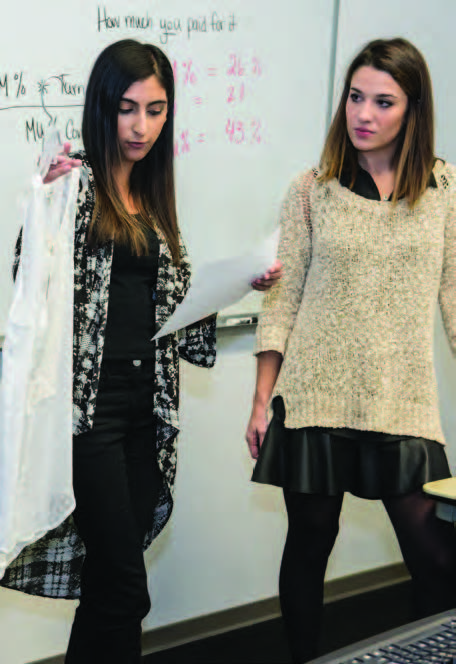
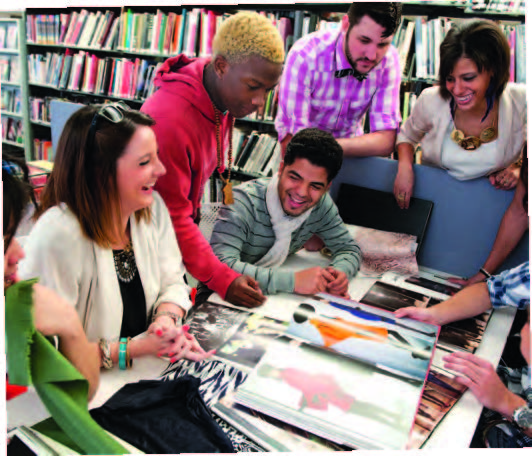
[top] Students travel to New York to attend the annual National Retail Federation (NRF) BIG SHOW [left] Students simulate a buying presentation to management. Class: Applied Buying [right] Students review luxury fashion brand "look books" Class: Trend Forecasting and Styling Concepts
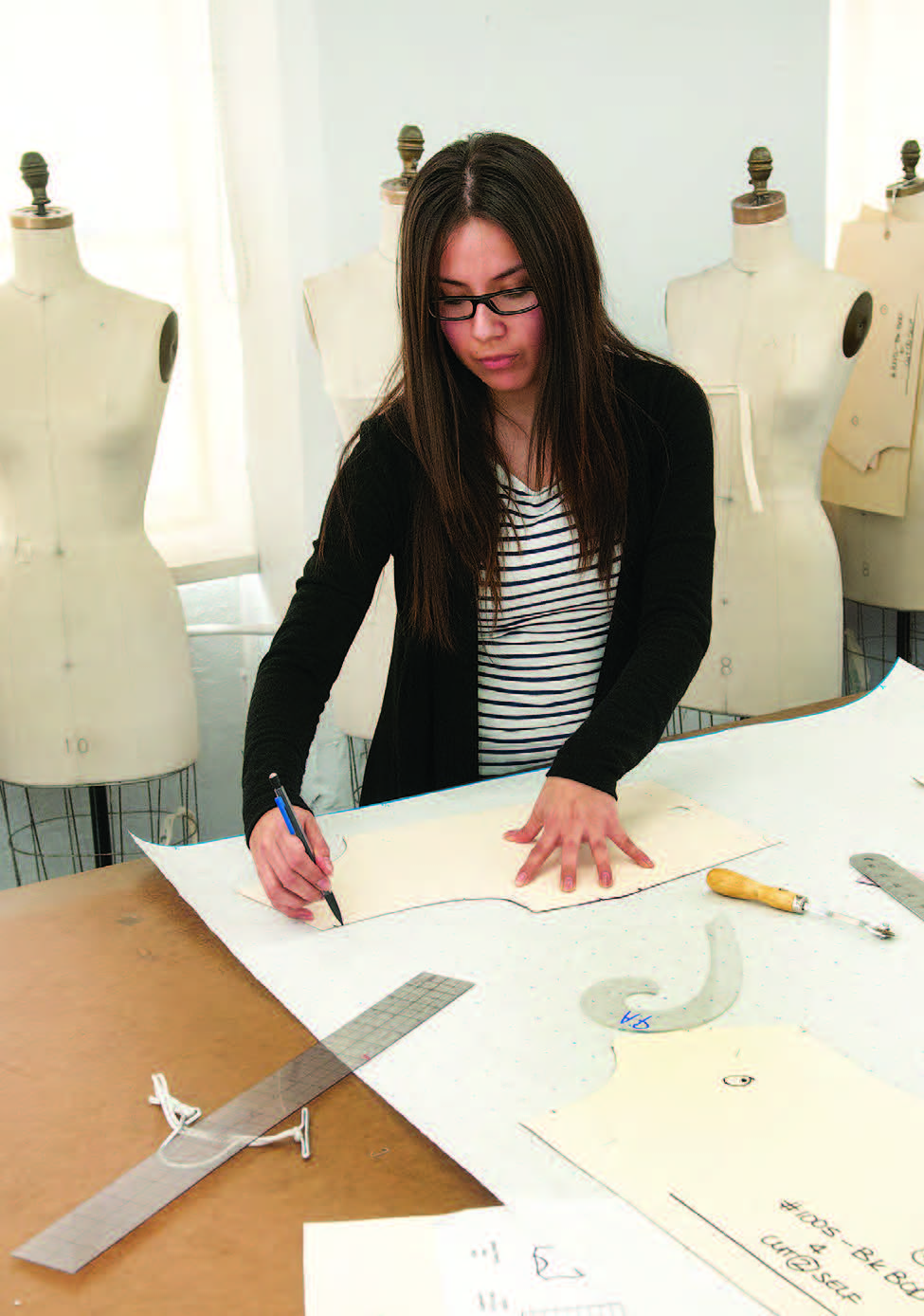
MERCHANDISE PRODUCT DEVELOPMENT
The Merchandise Product Development Program prepares students for a career in merchandising established fashion brands. The curriculum focuses on planning, developing, and presenting product lines, and on the technical design of individual styles within the line. Students learn to compete successfully in trend analysis, strategic planning, line development, and preproduction planning.
What Our Students Learn In our program, students learn how to analyze and apply trends in color, fabric, and style for design development, as well as the techniques to create specifications for how garments are made.
Why FIDM Students live and breathe a brand in the classroom to prepare them for their careers. Speakers from top companies (think Zara, Topshop, 7 For All Mankind, TOMS Shoes, ModCloth, Old Navy, and Halston) come onsite for Q&A panels and lectures. Our field trips give behind-the-scenes tours of trend offices, working factories, and showrooms. Students graduate from the program having created a portfolio of work for a variety of companies, products, and brands.
MERCHANDISE PRODUCT DEVELOPMENT
REQUIRED CLASSES FOR ASSOCIATE OF ARTS (A.A.) (for students without a prior college degree)
GNST 1040 English Composition
GNST 1200 20th Century Designers
GNST 1230 Color & Design Theory
GNST 1440 Textile Science
GNST 1450 College Mathematics
GNST 1600 Effective Speaking
GNST 1650 Critical Thinking
GNST 2420 Survey of Western Art II
GNST 2960 American Political & Economic History
GNST 2980 Professional Practices
MFTG 1400 Apparel Process I (6 hours)*
MFTG 1700 Apparel Process II (6 hours)*
MMKT 1550 Marketing & Brand Development
MPDV 1500 Product Development Fundamentals
MPDV 1700 Digital Flat Sketching
MPDV 1750 Trends & Fashion Forecasting
MPDV 1800 Fundamentals of Sketching
MPDV 2100 Fashion Merchandising & Assortment Planning
MPDV 2200 Digital Design
MPDV 2300 Trend & Design Application
MPDV 2400 Preproduction for Apparel
MPDV 2700 Classification & Line Development
MPDV 2750 Production & Sourcing Strategies
MPDV 2780 Technical Design
MPDV 2800 Advanced Preproduction
MPDV 2820 Fashion Start-Up Strategies
MPDV 2850 Brand Portfolio Development
MPDV 2880 Digital Presentation
TSCI 1800 Fabric Identification
TSCI 2100 Textile Application & Color Management
Total Units of Credit 90
REQUIRED CLASSES FOR PROFESSIONAL DESIGNATION (A.A.) (for students with a prior college degree)
GNST 1440 Textile Science
MFTG 1400 Apparel Process I (6 hours)*
MFTG 1700 Apparel Process II (6 hours)*
MPDV 1700 Digital Flat Sketching
MPDV 1800 Fundamentals of Sketching
MPDV 2100 Fashion Merchandising & Assortment Planning MPDV 2200 Digital Design
MPDV 2200 Digital Design
MPDV 2300 Trend & Design Application
MPDV 2400 Preproduction for Apparel
MPDV 2700 Classification & Line Development
MPDV 2750 Production & Sourcing Strategies
MPDV 2780 Technical Design –or–
MPDV 2800 Advanced Preproduction
MPDV 2820 Fashion Start-Up Strategies
MPDV 2850 Brand Portfolio Development
MPDV 2880 Digital Presentation
TSCI 1800 Fabric Identification
TSCI 2100 Textile Application & Color Management
Total Units of Credit 51
*Three (3)-hour lab included in 6 hours
For important information about the completion rate, educational debt, and earnings of students who attended this program, go to fidm.edu/go/ge/mpd.